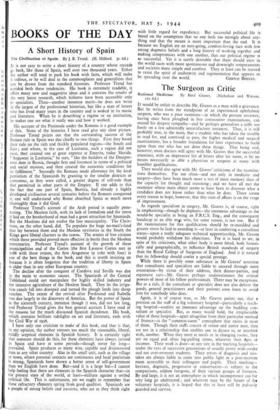hi rte re st! Ii
BOOKS OF THE DAY
A Short History of Spain
The Civilisation of Spain. By J. B. Trend. (H. Milford. 3s. 6d.)
IT is not easy to write a short history of. a country whose records go back, like those of Spain, well over two thousand years. Either the author will tend to pack his book with facts, which will make it tedious or he will deal in the commonplaces and generalities that can be drawn from the standard histories. Professor Trend has avoided both these tendencies. His book is extremely readable, it offers many new and suggestive ideas and it contains the results of the very latest research, which hitherto have been accessible only to specialists. Then—another immense merit—he does not write in the jargon of the professional historian, but like a man of letters who has lived many years in the country and is soaked in its music and literature. When he is describing a regime or an institution, he makes one see what it really was and how it worked.
His account of the Peninsula under the Romans is a good example of this. None of the histories I have read give any clear picture. Professor Trend points out that the outstanding success of the Roman rule in Spain was due chiefly to two things. First they based their rule on the rich and thickly populated regions—the South and East ; and where, in the case of Lusitania, such a region did nbt exist, they created one at great expense at Emerita, today Merida. "Augustus in Lusitania," he says, "like the builders of the Dneiper- stroi dam in Russia, thought first and foremost in terms of a political and social mission, and then created the economic conditions for its fulfilment." Secondly the Romans made allowance for the local patriotism of the Spaniards by granting to the smaller districts or conventus, as they were called, a greater degree of self-rule than that permitted in other parts of the Empire. If one adds to this the fact that one part of Spain, Baetica, had already a highly developed civilisation several centuries before the Romans conquered it, one will understand why Rome absorbed Spain so much more thoroughly than it did Gaul. Professor Trend's account of the Arab period is equally pene- trating. The Moslem faith, with its lack of formalism and the stress it laid on the brotherhood of man had a great attraction for Spaniards. But the Moslems did not evolve the free municipality. The Chris- tians, on the other hand, did. To populate the huge no-man's-land that lay between them and the Moslem territories in the South the Kings gave liberal charters to the towns. The armies of free citizens which these provided proved more effective in battle than the Moslem mercenaries. Professor Trend's account of the growth of these municipalities and of the Cortes (the first Leonese Cortes met in 1188 with three estates, the first Aragonese in 1162 with four) is one of the best things in the book, and this is worth insisting on because it is often forgotten that the tradition of liberty in Spain is older than in any other European country.
The decline after the conquest of Cordova and Seville was due in the main to economic causes. The Spaniards of the Central Tableland could not manipulate the highly skilled industry and the intensive agriculture of the Moslem South. They let the irriga- tion canals fall into disrepair and turned the plough lands into sheep ranches. The extent of the revival after Ferdinand and Isabella was due largely to the discovery of America. But the power of Spain in the sixteenth century, immense though it was, did not last long, and Professor Trend gives the best general account I have read of the reasons for the much discussed Spanish decadence. His book, which contains brilliant sidelights on art and literature, ends with the Civil War of 1936.
I have only one criticism to make of this book, and that is that, in my opinion, the Author stresses too much the reasonable, liberal, mildly sceptical elements in Spanish history. It is certainly right
1 that someone should do this, for these elements have always existed in Spain and have at some periods—though never for long— prevailed. Spain produces as many wise, capable and disinterested men as any other country. Also in the small unit, such as the village or town, where personal contacts are continuous and local patriotism Is strong, Spaniards have shown a better sense of self-government than we English have done. But—and it is a large but—I cannot help feeling that there are elements in the Spanish character that—in the present state of the world, at least—militate against a settled rolitical life. This is unfortunate, yet we ought to remember that these refractory crements spring from good qualities. Spaniards are a people of strong beliefs and passions, who act as they think right
with little regard for expediency. But successful political life is based on the assumption that no one feels too strongly about any- thing and that the means is more important than the end. It is because we English are an easy-going, comfort-loving race with few strong dogmatic beliefs and a long history of working together and making compromises with one another, that our political regime is so successful. Yet it is surely desirable that there should exist in the world races with more spontaneous and downright temperaments and societies more simple and carefree. They at least can be trusted to resist the spirit of uniformity and regimentation that appears to






















 Previous page
Previous page